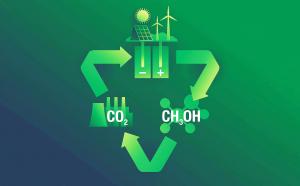Zero Carbon Methanol Fuel Market Driven by Green Shipping & Net-Zero Policies 2024–2031
Zero Carbon Methanol Fuel Market reached US$ 0.6 billion in 2022 and is expected to reach US$ 1.0 billion by 2030, growing with a CAGR of 6.6% during 2024-2031.
TEXAS, TX, UNITED STATES, August 22, 2025 /EINPresswire.com/ -- The Zero Carbon Methanol Fuel Market is gaining traction as industries and governments seek sustainable, low-emission alternatives to traditional fossil fuels. Zero carbon methanol, produced from renewable sources or via carbon capture, offers a promising pathway for decarbonizing heavy transport, shipping, power generation, and large-scale industrial applications. Growing demand is driven by stricter environmental regulations, global decarbonization initiatives, and expanding clean energy investments.Download exclusive insights with our detailed sample report (Corporate Email ID gets priority access): https://www.datamintelligence.com/download-sample/zero-carbon-methanol-fuel-market
Market Dynamics
Growth Drivers
• Regulatory Push for Decarbonization:
Worldwide climate policies and net-zero emission targets are compelling industries to adopt zero carbon fuels. Methanol’s versatility–its use in shipping, chemicals, and electricity generation–further amplifies its market potential.
• Technological Advancements:
Rapid progress in renewable methanol production, including biomass gasification and green hydrogen synthesis, is improving supply-chain scalability and cost-efficiency.
• Industrial and Energy Transition:
Large sectors like maritime, chemicals, and refineries are investing in zero carbon methanol as a drop-in replacement or key feedstock, ensuring continuity with existing infrastructure while slashing CO₂ emissions.
Market Restraints
• High Cost of Renewable Methanol:
Production from green sources is currently more expensive than fossil methanol, limiting adoption rates and competitiveness, especially in cost-sensitive applications.
• Infrastructure and Supply Chain Limitations:
Distribution networks, standards for fuel quality, and available renewable electricity or feedstocks are still developing, presenting initial challenges for large-scale deployment.
Market Segmentation
By Application (Maritime Fuel, Power Generation, Automotive Fuels, Chemical Feedstock)
By Source (Renewable Methanol (biomass, waste-to-energy), E-methanol (green hydrogen + CO₂ capture))
By End-Use (Transportation, Energy, Chemicals, Industrial Manufacturing)
Major shipping lines and chemical manufacturers increasingly lead in global demand, with maritime fuel and chemicals representing the largest segments for zero carbon methanol.
Geographical Penetration
The Zero Carbon Methanol Fuel market is witnessing strong growth across regions, driven by clean energy adoption and net-zero emission targets. Europe leads the market due to strict decarbonization policies, government incentives, and investments in green shipping fuel infrastructure. Asia-Pacific, particularly China and Japan, is rapidly expanding production capacity supported by renewable energy integration and rising demand for alternative fuels in transport and industry. North America shows steady adoption, backed by U.S. renewable fuel standards and growing interest in sustainable aviation fuel. Meanwhile, the Middle East is emerging as a key producer, leveraging abundant renewable resources for large-scale green methanol projects, while Latin America explores opportunities through biomass-based methanol production.
Looking for in-depth insights? Grab the full report: https://www.datamintelligence.com/buy-now-page?report=zero-carbon-methanol-fuel-market
Competitive Landscape
Global industry players include:
• Methanex Corporation
• OCI N.V.
• Carbon Recycling International
• BASF SE
• Proman AG
• Enerkem
• International Methanol Producers and Distributors
• Several emerging startups leveraging carbon capture and renewable energy
Notable Developments in Zero Carbon Methanol Fuel Market
Methanex Acquires OCI’s Methanol Business (~$2.05Bn)
Methanex agreed to acquire OCI Global’s methanol operations for about $2.05 billion—including cash, shares, and assumption of debt. Facilities in Beaumont, Texas (910,000 t/yr methanol + 340,000 t/yr ammonia), a 50% stake in the Natgasoline JV, and a facility in Delfzijl, Netherlands (1 million t/yr methanol capacity)
First Commercial-Scale e-Methanol Plant Opens (Denmark)
First Commercial-Scale e-Methanol Plant Opens Jointly developed by European Energy (Denmark) and Mitsui (Japan). Costing €150 million ($167M), it produces 42,000 metric tons/year of e-methanol using captured CO₂ and renewable energy. It is a major shipping firm Maersk, and industrial users like Novo Nordisk and Lego. Excess heat supplies 3,300 local households
HAMR Energy’s A$700–800M Methanol-to-SAF Project (Australia)
Build the nation’s first methanol-to-jet Sustainable Aviation Fuel (SAF) facility, converting 300,000 tonnes of low-carbon methanol into 125 million liters of SAF. Considering South Australia or Victoria, with a site decision expected by September 2025 and first production by 2030
HIF Global Secures $164M Investment — Includes e-Methanol Focus
HIF Global raised $164 million from existing backers plus Idemitsu Kosan (Japan). It has Funded e-fuels, including e-methanol, from renewable electricity + CO₂. Part of a four-phase collaboration including offtake, market development, and CO₂ supply chain building
HIF / MOL / JOGMEC Strategic Moves
Japan’s shipping giant MOL (via MOL Clean Energy) invests in HIF Global, aiming to develop e-fuel (including e-methanol) supply chains. HIF has attracted well over $200M in new funding in 2024—from MOL, Idemitsu, JOGMEC—to develop e-fuel capacity worldwide
Conclusion
The zero carbon methanol fuel market is at the forefront of the global transition to cleaner energy and sustainable chemicals. As technology matures, costs fall, and regulatory drivers intensify, zero carbon methanol will become increasingly integral to decarbonizing major industrial and transportation segments worldwide. Continued investments, cross-sector partnerships, and policy support will shape the next chapter of market growth.
Unlock 360° Market Intelligence with DataM Subscription Services: https://www.datamintelligence.com/reports-subscription
Power your decisions with real-time competitor tracking, strategic forecasts, and global investment insights-all in one place.
Competitive Landscape
Sustainability Impact Analysis
KOL / Stakeholder Insights
Unmet Needs & Positioning, Pricing & Market Access Snapshots
Market Volatility & Emerging Risks Analysis
Quarterly Industry Report Updated
Live Market & Pricing Trends
Consumer Behavior & Demand Analysis
Have a look at our Subscription Dashboard: https://www.youtube.com/watch?v=x5oEiqEqTWg
Related Reports:
Fuel Cell Market Share
Hydrogen Fuel Cells Market Size
Sai Kumar
DataM Intelligence 4market Research LLP
+1 877-441-4866
email us here
Visit us on social media:
LinkedIn
X
Legal Disclaimer:
EIN Presswire provides this news content "as is" without warranty of any kind. We do not accept any responsibility or liability for the accuracy, content, images, videos, licenses, completeness, legality, or reliability of the information contained in this article. If you have any complaints or copyright issues related to this article, kindly contact the author above.

